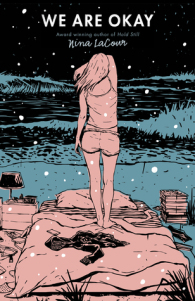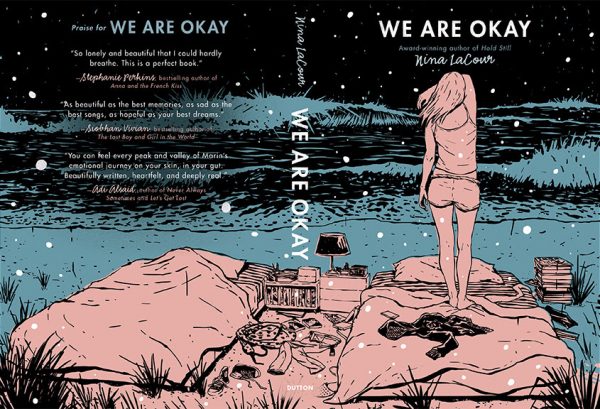Not to be dramatic, but we need to start this review with a common understanding stated outright: this novel is beautiful. The prose, the imagery, the point. All of it, beautiful.
I found this short novel by completely ignoring the adage about books and their covers, and I am so glad for it. The gorgeous cover illustration depicts a girl standing on her dorm bed, arm raised, covering her eyes from an unseen sun as she stares out over a dark shore. Snow falls around her.
She faces away from us and her world is a stark contrast of pink surveying an empty blue landscape and a black sky. As she stands among her messy belongings in rumpled pajamas, everything about this girl seems lonely. What is she looking for? If we think about the usual mental association of college as a community space where privacy might well not exist, the juxtaposition is even more jarring. In this context, what does it mean that this girl stands staring out at one of the loneliest sights one can know: the empty horizon?
This cover is the perfect illustration for the story of Marin, a college freshman who is briefly entertaining Mabel, a beloved and estranged figure from a life that she used to know. From Marin’s perspective, we cover the three days over her winter break that she shares with Mabel in what sounds like the emptiest, loneliest dorm ever, and which she calls “home”. Without revealing too much, Marin is haunted by the ghost of her grandfather’s passing, and all the weight that carries for a traumatized girl who is struggling to understand who she is against the broken foundation of who she thought she was.
We were innocent enough to think that our lives were what we thought they were, that if we placed all of the facts about ourselves together they’d form an image that made sense – that looked like us when we looked in the mirror, that looked like our living rooms and our kitchens and the people who raised us – instead of revealing all the things we didn’t know (128).
We follow her flashbacks and dissociations to piece together the mystery of what has torn this girl apart and, crucially, how she can come back together again. What does it mean to go through a tragedy that destroys you? What does it mean when you are changed deeply and immutably, but still need to go on living your life like everything is normal?
In this coming-of-age novel, LaCour heartachingly captures the paradox of such an experience; one in which a unique loneliness begets an almost overwhelming internal expansiveness. While the main character Marin’s queerness is not centered in this story, it is a real and present facet of her; and if you are like me, Marin’s relatability will make you itch to give this little starfish a hug.
A side note on the illustration: while this beautiful book jacket was done by Adams Carvalho, I was originally attracted to it because I was reminded of the unique style of queer author and illustrator Tillie Walden, whose webcomic “On a Sunbeam” touched my soul, and about which I will need to dedicate a future review.



